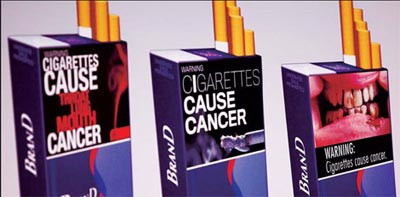|
 Three examples of proposed warning graphics that will appear on cigarette packs as part of the government's new tobacco prevention efforts, seen in Washington, on Wednesday. |
|
Corpses, cancer patients and diseased lungs are among the images the federal government plans for larger, graphic warning labels that would take up half of each pack of cigarettes sold in the United States. Whether smokers addicted to nicotine will see them as a reason to quit remains a question. The images are part of a new campaign announced by the Food and Drug Administration and the Department of Health and Human Services on Wednesday to reduce tobacco use, which is responsible for about 443,000 deaths per year. "Some very explicit, almost gruesome pictures may be necessary," FDA Commissioner Margaret Hamburg said. "This is a very, very serious public health issue, with very, very serious medical consequences," such as cancer, heart disease, strokes and lung diseases. The share of Americans who smoke has fallen dramatically since 1970, from nearly 40 percent to about 20 percent, but the rate has stalled since about 2004. About 46 million adults in the US smoke cigarettes. In the same period, the average cost per pack has gone from 38 cents to $5.33. Much of those increases are from state and federal taxes. It's unclear why declines in smoking have stalled. Some experts have cited tobacco company discounts or lack of funding for programs to discourage smoking or to help smokers quit. The new prevention plan is part of a law passed in June 2009 that gave the FDA authority to regulate tobacco, including setting guidelines for marketing and labeling, banning certain products and limiting nicotine. The law doesn't let the FDA ban nicotine or tobacco. The FDA is proposing 36 labels for public comment. They include phrases like "Smoking can kill you" and "Cigarettes cause cancer" and feature graphic images to convey the dangers of tobacco. Some of the labels include a man with a tracheotomy smoking a cigarette, a cartoon of a mother blowing smoke in her baby's face, rotting and diseased teeth and gums, as well as cigarettes being flushed down the toilet to signify quitting. The new warning labels are to take up the top half of a pack - both front and back - of cigarettes and contain "color graphics depicting the negative health consequences". Warning labels also must constitute 20 percent of advertisements. (Agencies) |
美国联邦政府计划在美国境内销售的香烟包装盒上使用更大幅的图片警示标识,警示图片将占去香烟盒面积的一半。其中的一些图片含有尸体、癌症病人及发生病变的肺脏的图像。 至于那些对尼古丁上瘾的吸烟者是否会因为这些警示图片而戒烟还是个未知数。 美国食品和药品监督管理局和美国卫生及公共服务部周三宣布了一项减少烟草使用的新运动,这些警示图片是该运动的一部分。每年有44.3万人的死亡与烟草有关。 药管局局长玛格丽特•汉伯格说:“可能有必要使用一些直观的、甚至是触目惊心的图片。这是一个非常非常严重的公共健康问题,会引发很严重的疾病”,比如癌症、心脏病、中风和肺病。 自1970年以来,美国吸烟人口的比重大幅下降,从近40%下降到了20%左右。但是,这一比重大约从2004年起就不再下降。在美国,大约有4600万成人是烟民。 在此期间,每盒香烟的平均价格从38美分上升为5.33美元。上涨的主要原因是各州和联邦政府提高了税收。 吸烟人口比重为何停止下降,原因尚不明确。一些专家认为,这是由于烟草公司打折出售香烟,或是因为鼓励或帮助吸烟者戒烟的项目资金不足所致。 2009年6月,美国通过了一部法律,授权药管局管制烟草,这项新的预防计划就是该法律的一部分。烟草管制包括制定有关香烟营销和标识的准则,禁止某些产品的销售,及限制尼古丁的使用量。不过,这部法律没有授权药管局禁止尼古丁或烟草的使用。 美国药管局提议使用的图片警示标识有36种,并就此征求公众意见。标识上的标语有“吸烟要人命”、 “吸烟致癌”等,还包含向公众传达吸烟的各种危害的图片。 这是其中的一些警示标识:戴着气管套管的吸烟男子,向婴儿脸上吐烟的母亲的漫画,腐烂病变的牙齿和牙龈,还有将香烟冲进马桶表示要戒烟的图像。 这些新的警示标识将被印在香烟盒的上半部分(正反面都如此),还须包含“描述由吸烟导致的各种健康问题的彩色图片”。此外,警示标识必须占据香烟广告面积的20%。 相关阅读 (中国日报网英语点津 实习生强凤华 编辑:陈丹妮) |
|
Vocabulary: gruesome: very unpleasant and filling you with horror, usually because it is connected with death or injury(令人厌恶的;恐怖的;可怕的) stall: to stop something from happening until a later date; to stop making progress(暂缓;搁置;停顿) tracheotomy: a medical operation to cut a hole in somebody's trachea so that they can breathe(气管切开术) |